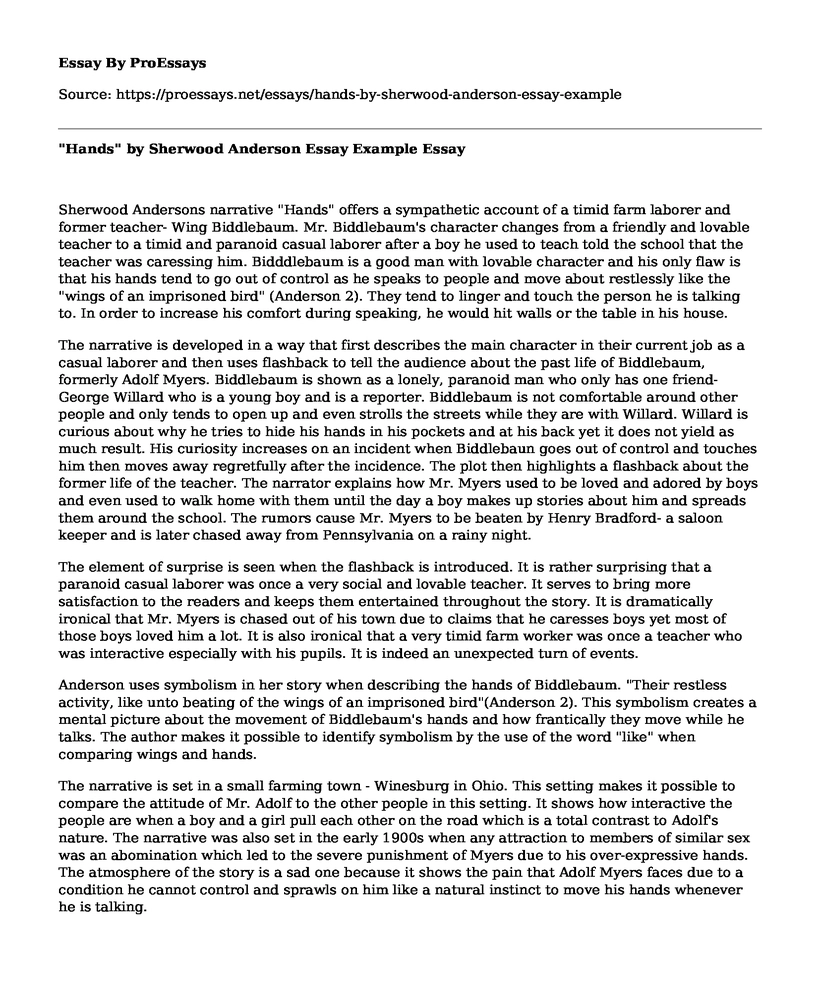Sherwood Andersons narrative "Hands" offers a sympathetic account of a timid farm laborer and former teacher- Wing Biddlebaum. Mr. Biddlebaum's character changes from a friendly and lovable teacher to a timid and paranoid casual laborer after a boy he used to teach told the school that the teacher was caressing him. Bidddlebaum is a good man with lovable character and his only flaw is that his hands tend to go out of control as he speaks to people and move about restlessly like the "wings of an imprisoned bird" (Anderson 2). They tend to linger and touch the person he is talking to. In order to increase his comfort during speaking, he would hit walls or the table in his house.
The narrative is developed in a way that first describes the main character in their current job as a casual laborer and then uses flashback to tell the audience about the past life of Biddlebaum, formerly Adolf Myers. Biddlebaum is shown as a lonely, paranoid man who only has one friend- George Willard who is a young boy and is a reporter. Biddlebaum is not comfortable around other people and only tends to open up and even strolls the streets while they are with Willard. Willard is curious about why he tries to hide his hands in his pockets and at his back yet it does not yield as much result. His curiosity increases on an incident when Biddlebaun goes out of control and touches him then moves away regretfully after the incidence. The plot then highlights a flashback about the former life of the teacher. The narrator explains how Mr. Myers used to be loved and adored by boys and even used to walk home with them until the day a boy makes up stories about him and spreads them around the school. The rumors cause Mr. Myers to be beaten by Henry Bradford- a saloon keeper and is later chased away from Pennsylvania on a rainy night.
The element of surprise is seen when the flashback is introduced. It is rather surprising that a paranoid casual laborer was once a very social and lovable teacher. It serves to bring more satisfaction to the readers and keeps them entertained throughout the story. It is dramatically ironical that Mr. Myers is chased out of his town due to claims that he caresses boys yet most of those boys loved him a lot. It is also ironical that a very timid farm worker was once a teacher who was interactive especially with his pupils. It is indeed an unexpected turn of events.
Anderson uses symbolism in her story when describing the hands of Biddlebaum. "Their restless activity, like unto beating of the wings of an imprisoned bird"(Anderson 2). This symbolism creates a mental picture about the movement of Biddlebaum's hands and how frantically they move while he talks. The author makes it possible to identify symbolism by the use of the word "like" when comparing wings and hands.
The narrative is set in a small farming town - Winesburg in Ohio. This setting makes it possible to compare the attitude of Mr. Adolf to the other people in this setting. It shows how interactive the people are when a boy and a girl pull each other on the road which is a total contrast to Adolf's nature. The narrative was also set in the early 1900s when any attraction to members of similar sex was an abomination which led to the severe punishment of Myers due to his over-expressive hands. The atmosphere of the story is a sad one because it shows the pain that Adolf Myers faces due to a condition he cannot control and sprawls on him like a natural instinct to move his hands whenever he is talking.
The narrative would lose the sense of double-perspective if told from another point of view. Double perspective is seen when the narrator views both the feelings of Adolf and the feeling that society has. If the story is told from Adolf's view, for example, it would lose the sense that the community condemns any sexual activities between teachers and pupils. The title of the play is related to the story in that the story highlights the lack of control forehands that Adolf has and how this costs him his teaching job and is at the verge of being killed.
Conclusion
To sum it all up, the story creates a casual effect since it has no specific order of events and the writer uses flashbacks and other styles. It helps create suspense and even manages to create a better understanding; an aspect that is without any doubt endearing to the reader.
Works cited
Anderson, Sherwood. Hands. 1916, english307formsofmodernshortstory.web.unc.edu/.../Hands-by-Sherwood-Anderson.pdf.
Cite this page
"Hands" by Sherwood Anderson Essay Example. (2022, Aug 30). Retrieved from https://proessays.net/essays/hands-by-sherwood-anderson-essay-example
If you are the original author of this essay and no longer wish to have it published on the ProEssays website, please click below to request its removal:
- Essay Analysis of Salvation by Langston Hughes
- The Great Gatsby is One of America's Greatest Novel: Literary Analysis Essay
- The Lamb to the Slaughter Critical Essay
- Similarities of Beowulf, Hamlet, Things Fall Apart, and The Things They Carried
- Essay Example on Trifles: A Murder Mystery With Gender-Based Conflict
- Essay Sample on A Rose for Emily: Exploring William Faulkner's Miss Emily, Language, and Themes
- Essay Sample on Hero: A Symbol of Courage, Nobility, and Achievement







